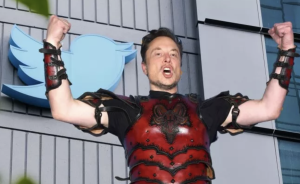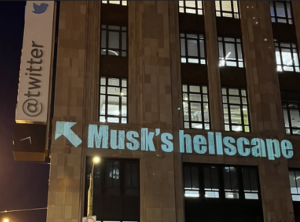Stick with me here…it will be worth it.
Yesterday’s post about private equity’s investments in worker’s comp services generated a flurry of private emails and a few comments – most echoing the “service is king” mantra.
Today’s news that Twitter is near collapse adds depth to the service discussion – and the ultimate cost of hubris.
Elon Musk is both one of the most transformational leaders and one of the biggest (insert anatomical reference here) of the last century. He is in large part responsible for shifting personal transportation away from fossil-fuel driven cars, an incredibly difficult and critically important transition.

If your boss shows up wearing this, call your favorite recruiter.
He also has a severe case form of “Michael Jordan Syndrome” or MJS. Jordan was a transformational basketball player, perhaps the greatest ever. His skills, ability, drive and impact on the game are unparalleled.
Then he tried baseball, because, you know, if you’re great, you’re…great.
Well, no…Jordan was not good at baseball. He had a hole in his swing you could drive a bus through, made a ton of mistakes on the base paths and in the outfield, and generally was a not very good minor league player.
After a couple seasons sitting in a bus driving around the South playing in front of a few hundred fans every night, Jordan recognized that being awesomely great at one thing did not mean you would be great at other things.
Musk’s amazingly stupid, shortsighted, arrogant and destructive decisions in the very few days he’s owned Twitter have been breathtakingly bad and may well cost him his entire $44 billion investment. And has helped tank Tesla stock in the process; Tesla has lost $700 billion in value in less than a year.
Besides electrifying transportation, bringing reliable internet to remote areas, and launching rockets into space, Musk can lay claim to another singular achievement – Never in the course of humanity has so much “value” been destroyed so quickly. So he’s got that going for him.
His catastrophically bad leadership of a social media giant also makes Jordan’s aborted foray into professional baseball look like an overwhelming success – and Musk like the best example ever of Michael Jordan Syndrome (also known as hubris).
Rather than walk through all of Musk’s more notably destructive decisions, all of which I am quite sure made perfect sense to him at the time, because similar decisions “worked” at Tesla, let’s just focus on one – treating people like &^%$(@#$.
Musk seemed to think he could force Twitter employees to work like galley slaves while insulting them.
Hundreds have given Musk the single-finger salute, leading to major service issues.
This from MSN.com:
“I know of six critical systems (like ‘serving tweets’ levels of critical) which no longer have any engineers,” a former employee said. “There is no longer even a skeleton crew manning the system. It will continue to coast until it runs into something, and then it will stop.”
Musk slashed staff, trying to force them to return to the office within 12 hours (helloooo…parents of small kids!!), and demanding obscenely brutal work schedules, all to create bigger profits.

Instead, he’s on the verge of turning $44 billion into a gigantic mountain of ash.
There’s a clear lesson here – employees create “value” – management doesn’t.
Employees do this by showing up every day committed to doing good work, by using their brains and muscle to produce goods and services, by thinking hard about how to do things better, faster, and more effectively.
Beating them over the head, firing half of them, and telling survivors you don’t give a rat’s rear end about them is monumentally dumb.
Of course, Musk’s arrogant stupidity represents the worst-case of employee under-valuing. BUT, just because PE firms don’t push things this far does NOT mean many aren’t making the same mistakes, mistakes that will take longer to play out in the form of unhappy customers, lower revenues, and lost business.
But play out they have – and will.
What does this mean for you?
Execs serve management.
Management serves the workers.
Workers are the ones that actually serve customers.



Joe, couldn’t have said it better myself! Often time we forget who actual does the hard work that creates our customers’ experience.
Thank Dennis – can’t agree more.
be well Joe
Well put Joe. And that sure needed to be said. Great post! (Borrowing from sports radio, “Long time listener, first time caller”)
Thanks Tom! Coming from a former CEO this means a lot.
Best Joe
Hi Joe.
I literally face-palmed after reading this.
I was stunned that you used the Jordan going to baseball example when this is more akin to Jordan returning to basketball. In fact, software development is Elon’s “home court”. Twitter was hemorrhaging cash for several years as costs were spiraling out-of-control. Jack Dorsey (Twitter founder) and Elon Musk have been personal friends for decades. Elon views his actions as SAVING Twitter. Please consider the following interview between Elon Musk and Twitter Employees with an open mind before passing such harsh judgment (read “amazingly-stupid, shortsighted, arrogant, and destructive decisions”) around the over-hyped employee abuse and value destruction narratives. https://www.theverge.com/2022/11/10/23452196/elon-musk-twitter-employee-meeting-q-and-a I wish Elon and all of the Twitter employees who remained an abundance of success with Twitter 2.0.
Hey Les
Thanks for the note. I appreciate your perspective. Thanks for sharing the interview.
I’ve had several conversations with others, who share your view or views similar to it. At the end of the day I think there are several challenges for musk.
Changing culture is really difficult even in the best of times. These are hardly the best of times at Twitter. Revenue related problems for years, coupled with his autocratic and dictatorial and punitive interactions with employees are far from helpful to his cause.
Of course, musk thinks he can “save Twitter”. I don’t see how that’s relevant to whether he actually can.
Musk was pretty much a founder for Tesla and SpaceX. He was a main driver of the culture in the business. This is not the case with Twitter; Twitter is a social media company that has been around for years, both factors are quite different from Tesla and SpaceX.
as you know, Twitter has been having problems – financial ones – for years.
Those problems revolve around insufficient revenue. The vast majority is advertising. Again, musk’s experience with advertising – based business models is quite thin.
Here’s a great read from Scott Gallowa I this issue. https://www.profgalloway.com/elephants-in-the-room/
There is a fundamental problem with social media-based advertising, which can be seen in declining ad revenue for most of the major platforms.
Add to this his decision to allow Kanye West, and other highly controversial figures back on Twitter.
At the end of the day, it’s about culture change and motivated employees plus growing advertising revenue.
Musk may succeed although I seriously doubt it.
The net is musk is not returning to basketball.